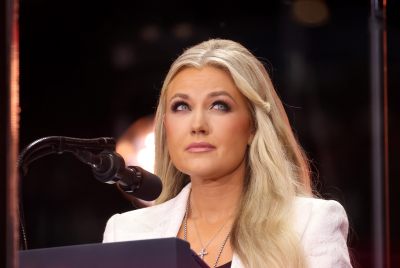Wikipedia Faces Backlash Over Attempt to Delete Page on Ukrainian Refugee's Killing
Critics accuse the site of censorship after the murder of a Ukrainian refugee sparks fury online and questions about crime.

The stabbing death of 23-year-old Ukrainian refugee Iryna Zarutska on a Charlotte train shocked many, but it is the internet storm that followed which has turned her case into a global flashpoint.
Outrage erupted after Wikipedia editors attempted to delete the article detailing her killing, fuelling accusations of censorship, media bias, and political influence.
Online Fury Over Wikipedia Deletion
An entry titled Killing of Iryna Zarutska briefly appeared on Wikipedia, documenting her murder. Yet within hours, editors moved to nominate it for deletion.
The move infuriated social media users, who argued the online encyclopaedia was erasing her story while similar crimes in the US had long warranted permanent entries.
Critics accused Wikipedia of selective editing and silencing victims who do not fit a preferred narrative.
BREAKING - Wikipedia is attempting to remove the entry for Iryna Zarutska, the young Ukrainian woman slain in Charlotte, North Carolina. pic.twitter.com/MP5vtCJm3m
— Right Angle News Network (@Rightanglenews) September 7, 2025
Wikipedia is erasing Iryna Zarutska. She was 23, stabbed to death on a Charlotte train by a man with 14 prior arrests. The system kept turning him loose and she ended up dead. Now instead of confronting that failure the media stays quiet and Wikipedia tries to scrub her name. It… pic.twitter.com/5nZmseii6M
— Ian Miles Cheong (@stillgray) September 8, 2025
The uproar spread across X, where platform owner Elon Musk weighed in, calling out mainstream media for largely ignoring the case. 'Why has this story been buried?' Musk asked, amplifying the backlash to his 190 million followers.
British broadcaster Piers Morgan also joined the debate, describing Zarutska's murder as 'disgusting, senseless, [and] unprovoked' while questioning why it had not dominated headlines.
Conservative commentators went further, accusing Wikipedia of protecting establishment narratives through digital erasure.
— Elon Musk (@elonmusk) September 9, 2025
The Fatal Attack
On 22 August, Zarutska boarded Charlotte's Lynx Blue Line wearing a simple T-shirt, hat, and wire-rimmed glasses. As she scrolled on her phone, 34-year-old Decarlos Brown Jr., dressed in a red hoodie, suddenly drew a knife and fatally stabbed her in what police described as an unprovoked attack.
Brown, who has a lengthy criminal record including robbery and threats, was quickly arrested and charged with first-degree murder.
His repeated releases from custody, most recently on a mere 'written promise' to appear in court, have raised deep concerns about the failures of the US justice system.
For Zarutska, who fled war in Ukraine in search of safety, the brutal killing became a tragic symbol of vulnerability and misplaced trust.
From Local Tragedy to Cultural Flashpoint
What began as a horrific local crime soon exploded into a wider cultural clash online. Videos, commentary, and editorials on X turned Zarutska's story into a lightning rod for debates on crime, immigration, race, and media priorities in America.
Some commentators contrasted the muted national coverage of her killing with the global attention given to the death of George Floyd, calling the discrepancy proof of double standards in which tragedies receive amplification.
President Donald Trump even weighed in, vowing to investigate and blasting Democrats for 'soft-on-crime policies.'
Why is the disgusting, senseless, unprovoked murder of 23-year-old Ukrainian refugee Iryna Zarutska by a man named Decarlos Brown Jr. on a train in Charlotte NC not getting more media attention?! pic.twitter.com/9UDPxguWhN
— Piers Morgan (@piersmorgan) September 7, 2025
President Donald Trump “ just heard “ about Мurder of Iryna Zarutska on the train, that’s how quiet the mainstream media is keeping it since it was a white woman and a black man who did it named Decarlos Brown Jr. Charlotte, North Carolina failed this Ukrainian refugee. pic.twitter.com/goyP0HpEB7
— Sputnik🛰️ (@VasBroughtToX) September 8, 2025
Wikipedia is actively trying to erase Iryna Zarutska, the young Ukrainian woman brutally murdered in Charlotte.
— Benny Johnson (@bennyjohnson) September 7, 2025
You don’t hate them enough. pic.twitter.com/kPbMqBJfdv
Whose Stories Get Remembered?
Nearly three weeks after Zarutska's death, national news outlets had still provided little to no coverage. Instead, her story has lived primarily on social media, in surveillance footage, hashtags, and heated debates.
The attempt to scrub her from Wikipedia has only intensified anger. For many, the issue is no longer just about one young woman's tragic death, but about who gets to decide which victims are remembered, which are forgotten, and how editorial choices shape public consciousness.
As Musk, Morgan, and thousands of online voices continue to demand answers, the controversy shows no sign of fading.
What started as a senseless killing on a Charlotte train has now become a defining clash over truth, memory, and the power of digital platforms to shape history.
© Copyright IBTimes 2025. All rights reserved.





















